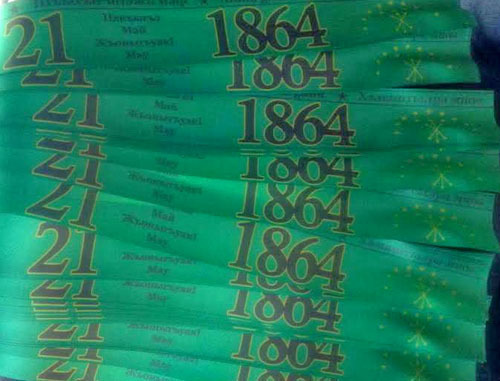
Circassians Want Russia to Recognize 19th Century Conquest as ‘Genocide’
Publication: Eurasia Daily Monitor Volume: 11 Issue: 98
By:

On May 21, Circassian communities worldwide commemorated the 150th anniversary of the end of the Russian-Circassian war. According to some accounts, the war lasted for a hundred years—from 1763, when Russian armies invaded Eastern Kabarda, to 1864 when the Russian military paraded at the place Krasnaya Polyana near the modern-day city of Sochi. The Russian Empire killed or deported to the Ottoman Empire an estimated 90 percent of the Circassian population of the Caucasus. As a result of the large-scale deportation of the Circassians, the majority of them now reside outside their North Caucasus homeland. To mark the anniversary, Circassians held demonstrations in Turkey, Germany, the United States, the North Caucasus and elsewhere.
The Circassian-Russian war of the 19th century has been a matter of great controversy in the North Caucasus. The tensions derive from the Circassian belief that Moscow should recognize what the Russian Empire did to the Circassians as “an act of genocide.” The Russian government, in turn, tries to ignore the issue or deny its importance, quietly putting pressure on the regional authorities in the North Caucasus to alter the discourse. In the run-up to the 150th anniversary of the conclusion of the Russian-Circassian war, Circassian organizations in Adygea, Karachaevo-Cherkessia and the Krasnodar region addressed President Vladimir Putin once again, asking him to recognize the “Circassian genocide” (https://www.aheku.net/news/society/3542).
More importantly, a group of activists from the North Caucasus, led by Israeli activist Avrom Shmulevich, addressed Ukraine’s acting president, Oleksandr Turchynov, asking him to recognize the “Circassian genocide” (https://www.natpress.info/index.php?newsid=8989). The activists apparently expect the Ukrainian government to be especially sympathetic to the plight of the Circassians in the North Caucasus, given Russia’s aggressive policies against Ukraine. Shmulevich predicted that Ukraine would recognize the “Circassian genocide” before the end of 2014 (https://avrom-caucasus.livejournal.com/359996.html).
The voice of Turkish officials, where the majority of Circassians reside, was also unusually strong. The deputy speaker of the Turkish parliament, Sadik Yakut, said: “The right of return of peoples who were expelled from their homeland should be considered from the point of view of human rights. Circassians have the natural right to be granted dual citizenship in countries where they reside, and for May 21 to be recognized as the day of the genocide and expulsion of Circassians” (https://www.aheku.org/news/society/5822).
The authorities in republics with titular Circassian populations have remained relatively timid. For example, several years ago, Circassian activists in Adygea asked the authorities to build a monument dedicated to the Circassian victims of the Russian-Circassian war. The government instead built a monument called Unity and Accord that included both those who fought on the Russian side and on their home country’s side. A Circassian activist from Adygea, Aslan Shazzo, told Ekho Kavkaza radio: “We want a monument for our fallen. Only defenders of the homeland should be among them, but not the tsarist soldiers who died in the war.” In Nalchik, Kabardino-Balkaria, republican officials oversaw the celebrations this year. Republican Deputy Prime Minister Ruslan Firov practically chaired the commission on celebrations. An estimated 3,000–4,000 people participated in the events in Nalchik. The Russian authorities’ pressure manifested itself most vividly in Moscow. Police arrested Circassian activist Beslan Teuvazhev on May 19, and law enforcement agents confiscated 71,000 Circassian ribbons, which depicted Circassian symbols and dates of the Russian-Circassian war. Teuvazhev was soon released, but the police did not return the ribbons, saying they were being checked “for extremism” (https://www.ekhokavkaza.com/content/article/25393637.html).
On May 20, Circassian activists in the village of Akhintam, in the Sochi area, held a night vigil, lighting 101 candles—representing the number of years the Russian-Circassian war lasted. A Circassian leader from Krasnodar region, Aslan Gvashev, told Kavkazsky Uzel that Circassians perceive the Black Sea as a big grave for all the Circassians deported in the 1860s. “The majority of the coastal Circassian villages do not fish and do not even swim in the sea. This sea is full of our ancestors’ bones and we cannot allow ourselves any other attitude,” Gvashev said (https://www.kavkaz-uzel.ru/articles/242975/).
Sergei Arutyunov, a well-known Russian historian and member of the Russian Academy of Sciences, told Kavkazsky Uzel that in order to resolve the controversy around the Russian-Circassian war, the Russian government should recognize the Circassian “genocide.” Moreover, Arutyunov suggested that the government remove monuments dedicated to Russian heroes who fought in the North Caucasus and return the original names of the settlements. Referring to a town in the Sochi area named after General Ivan Lazarev—who was known, especially among the Circassians, for his brutality during the Russian conquest of the Caucasus in the 18th–19th centuries—Arutyunov said: “Lazarev was a person of great accomplishments in Russian history and no one is prepared to forget about that. However, the settlement called Lazarevsky should be somewhere where he was born or some other place that is connected to his biography, not in the place where he fought and where his role was controversial” (https://www.kavkaz-uzel.ru/articles/242980/). The Russian authorities installed monuments dedicated to controversial Russian generals in the historical Circassians lands, further antagonizing the Circassian population.
Russian historians pretend that history is free from government intervention despite the fact that President Putin himself has urged the government to produce a single view of Russian history to avoid stirring doubts and controversy within the younger generation. Many Russian historians still use outdated concepts, describing the deportation of the Circassians to the Ottoman Empire as a “voluntary resettlement” and even denying the very fact of the Russian-Circassian wars. The language used by Russian professional historians is often quite biased. For example, instead of saying that the Russian Empire conquered the North Caucasus, they say “after many military campaigns between the Russian armies and the mountaineers, the region entered the Russian Empire” (https://georgia.kavkaz-uzel.ru/articles/242940/).
In using such wording, Russian historians and politicians are attempting to put the conquerors and their victims on the same footing and depersonalize the conquest of the North Caucasus by Russia as a kind of process of accession of the region into the Russian state that progressed almost on its own. Circassians have become remarkably united around the tragic events of the past and Russian authorities will have to take this into account sooner or later.




